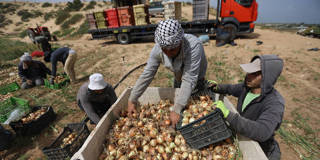Now that the Trump administration has offered a blueprint for economic development and reform in the Palestinian territories, the opportunity costs of maintaining the status quo are clear for all to see. Although the Palestinians remain opposed to the plan, at least now they can start to consider the economic potential of peace.
STANFORD – At a workshop this week in Bahrain, White House Senior Adviser Jared Kushner presented an ambitious economic-development initiative for the Palestinian people. The Trump administration’s hope is that its Peace to Prosperity proposal will untie the Gordian knot of the Israeli-Palestinian conflict, finally establishing peace between the Jewish State and its neighbors.
Though the workshop included several countries with vital interests in the region and a potential role to play in an economic-development program, the Palestinians refused to participate. As a result, the Israelis were not included, either. Palestinian officials consider it an insult to think they would alter their longstanding political demands in exchange for economic assistance. But the White House’s plan throws into sharp relief the opportunity costs of maintaining the status quo. Transforming the economy of the West Bank and Gaza could bring vast improvements to most Palestinians’ quality of life.
The US plan (to which I provided a few suggestions) is nothing if not ambitious. Grants and loans to the Palestinian territories would be accompanied by measures to strengthen property rights and the rule of law, strengthen the judiciary, improve infrastructure, and expand trade with Israel and other parts of the region. The goal is to double the territories’ GDP and create one million jobs, thereby halving poverty.

STANFORD – At a workshop this week in Bahrain, White House Senior Adviser Jared Kushner presented an ambitious economic-development initiative for the Palestinian people. The Trump administration’s hope is that its Peace to Prosperity proposal will untie the Gordian knot of the Israeli-Palestinian conflict, finally establishing peace between the Jewish State and its neighbors.
Though the workshop included several countries with vital interests in the region and a potential role to play in an economic-development program, the Palestinians refused to participate. As a result, the Israelis were not included, either. Palestinian officials consider it an insult to think they would alter their longstanding political demands in exchange for economic assistance. But the White House’s plan throws into sharp relief the opportunity costs of maintaining the status quo. Transforming the economy of the West Bank and Gaza could bring vast improvements to most Palestinians’ quality of life.
The US plan (to which I provided a few suggestions) is nothing if not ambitious. Grants and loans to the Palestinian territories would be accompanied by measures to strengthen property rights and the rule of law, strengthen the judiciary, improve infrastructure, and expand trade with Israel and other parts of the region. The goal is to double the territories’ GDP and create one million jobs, thereby halving poverty.